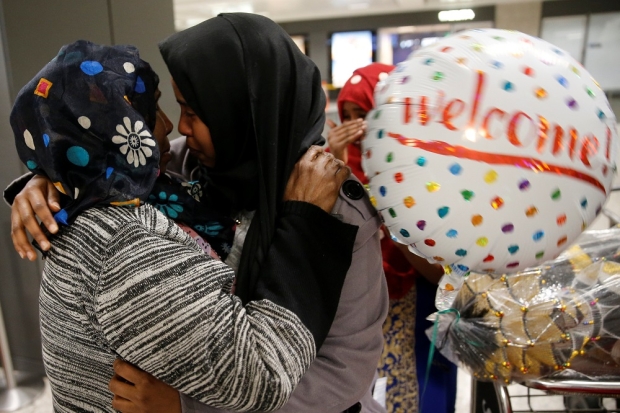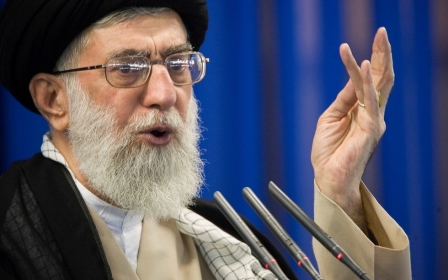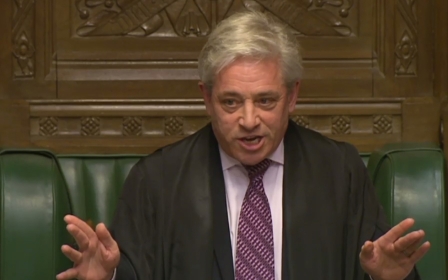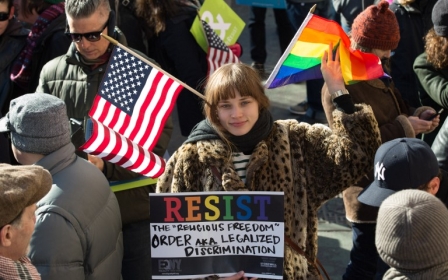US Homeland Security chief regrets rapid rollout of ban
US Homeland Security chief John Kelly told a congressional panel on Tuesday he should have delayed President Donald Trump's ban on refugees and citizens from seven Muslim-majority countries so he could brief Congress on the executive order.
The order, signed with little or no briefing of US government agencies or congressional heads, caused confusion over which travelers were banned and forced the White House to reverse itself and say those with green cards would be granted waivers.
The temporary ban ignited international protests as the United States revoked 60,000 visas and detained some travelers who landed in the United States unaware the order had been signed while they were in flight.
"The desire was to get it out quick so that potentially people that might be coming here to harm us would not take advantage of some period of time that they could jump on an airplane and get here," Kelly told the House of Representatives Committee on Homeland Security.
Kelly took the blame for not briefing Congress on the order before it was announced late on Friday, 27 January.
"This is all on me by the way. I should have delayed it just a bit so that I could talk to members of Congress," he said.
Kelly said the confusion at US airports was caused by court orders challenging the ban that went out the day after it went into effect, adding that his team at DHS took fast action to tweak their operations as necessary.
Legal headache
The ban was suspended by a federal judge on Friday, opening a window for refugees and citizens from Iran, Iraq, Libya, Somalia, Sudan, Syria and Yemen to enter the United States, pending an appeal by the US government.
Trump's executive order on immigration has legal experts grappling with a key question: how broad is the US president's reach when it comes to shaping migration policy?
For now, all eyes are on the Ninth Circuit Court of Appeals, based in San Francisco, as it weighs the restraining order issued by Seattle federal judge James Robart that temporarily halted the ban nationwide.
"The opinion of this so-called judge, which essentially takes law-enforcement away from our country, is ridiculous and will be overturned!"
-President Trump
A hearing before three judges - two of whom were appointed by Democratic presidents, and one by a Republican - is set for Tuesday at 3pm Pacific time. But court officials said judges will not make a decision on Tuesday.
As a federal judge, Robart's ruling has nationwide validity. While several other federal judges had previously issued rulings on narrow aspects of Trump's executive order, his was the first to address it as a whole.
The Trump administration has challenged Robart's ruling by filing an emergency motion with the Ninth Circuit Court of Appeals saying that suspending the ban was causing "irreparable harm" to the American public.
The primary plaintiffs are two Democratic-leaning states that border Canada: Washington, where Robart sits, and Minnesota. They were backed in a court brief filed by 16 state attorneys general.
Trump has attacked Robart in a string of fiery tweets.
"The opinion of this so-called judge, which essentially takes law-enforcement away from our country, is ridiculous and will be overturned!" the president wrote.
What are the arguments?
Trump justifies his decree by invoking Article II of the Constitution, which grants the president authority to direct immigration policy and conduct foreign affairs.
The Department of Justice has defended the president's travel ban as a "lawful exercise" of his authority, and claims the federal court erred in barring enforcement of the measure.
Trump's argument is also founded in part on a 65-year-old provision of the federal Immigration and Nationality Act, which allows the president to suspend US entry of any category of foreigners whose presence he deems "detrimental to the interests of the United States".
Government lawyers are trying to bolster this argument by saying that the judiciary is unqualified to decide on national security matters.
"Unlike the president, courts do not have access to classified information about the threat posed by terrorist organizations operating in particular nations, the efforts of those organizations to infiltrate the United States, or gaps in the vetting process," they wrote in their appeal.
Those opposed to the White House decree also cite the Constitution, saying that the executive order violates its fundamental principles including those on equality, freedom of movement and freedom of religion.
They also emphasise that the role of the judicial branch is to check the power of the executive, especially to protect minorities.
The states pin the legitimacy of their complaint on the fact that Trump's ban affects them through its negative consequences on employment, business and education.
They also warn that reinstating the ban could threaten public order, considering the chaos that broke out, especially in airports, following its hurried implementation.
The appeals court can opt to reinstate the ban, confirm its suspension - or schedule an additional hearing.
If the ban is restored, authorities have yet to indicate whether they have taken steps to avoid a repeat of the airport detentions and deportations which fueled international outrage and mass protests the first time around.
If the court takes the second option, Robart's decision would remain in place nationwide, keeping the US open to refugees and travellers from the seven targeted countries.
The losing party would be able to request the Supreme Court to take on the case.
If the nation's highest court accepts, five of the eight total judges would be required to reverse the decision from the Court of Appeals.
Achieving that majority poses a challenge: the Supreme Court is currently ideologically split between four conservatives and four progressives.
Trump has nominated a conservative, Neil Gorsuch, to fill the vacant ninth seat. But he must first get confirmed by the Senate.
New MEE newsletter: Jerusalem Dispatch
Sign up to get the latest insights and analysis on Israel-Palestine, alongside Turkey Unpacked and other MEE newsletters
Middle East Eye delivers independent and unrivalled coverage and analysis of the Middle East, North Africa and beyond. To learn more about republishing this content and the associated fees, please fill out this form. More about MEE can be found here.





